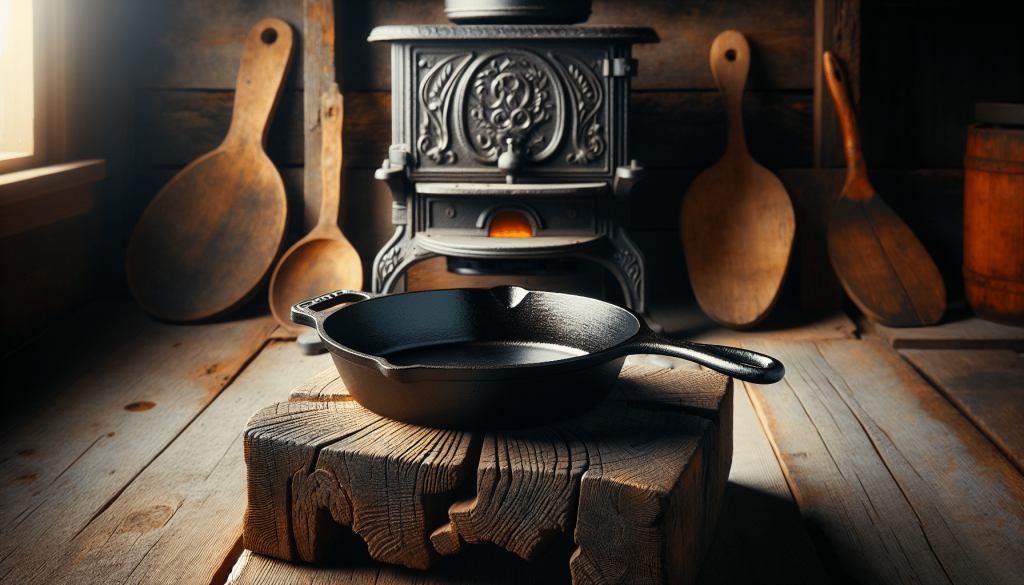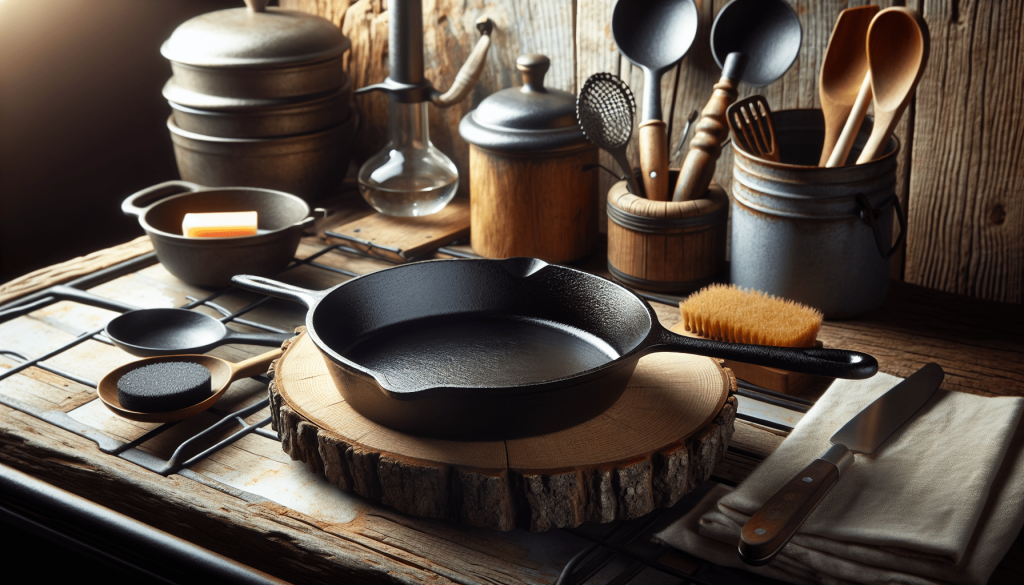If you’re an avid home cook or simply enjoy experimenting in the kitchen, you’ve likely heard of cast iron cookware. In recent years, it has gained increasing popularity among culinary enthusiasts for its durability and ability to evenly distribute heat. However, like any cooking tool, cast iron has its advantages and drawbacks. In this article, we’ll explore the pros and cons of cast iron cookware, helping you make an informed decision about whether it’s the right fit for your culinary adventures. So, grab your apron and let’s get cooking!
Durability
Long-lasting
When it comes to durability, cast iron cookware is hard to beat. It is known for its incredible longevity, with some pieces lasting for generations. Unlike other types of cookware that can wear down or break over time, cast iron can withstand the test of time. Whether you’re using it on a regular basis or only occasionally, you can trust that your cast iron cookware will hold up.
Resistant to scratches and chips
The superior durability of cast iron cookware also translates to its resistance to scratches and chips. While other cookware materials may show signs of wear and tear after a few uses, cast iron maintains its smooth surface. This means you don’t have to worry about using metal utensils or accidentally dropping a pot or pan and causing damage. Cast iron can handle the demands of everyday cooking without showing signs of wear.
Heat Retention
Superior heat retention
One of the standout features of cast iron cookware is its ability to retain heat. Unlike other materials that quickly lose heat, cast iron holds onto it, ensuring your food cooks evenly and thoroughly. This makes cast iron ideal for dishes that require long, slow cooking, such as stews and braises. The heat retention of cast iron allows for a more consistent and efficient cooking experience.
Even heat distribution
In addition to its heat retention, cast iron also offers exceptional heat distribution. This means that once the cookware is heated, the heat will spread evenly across the surface. No more hot spots or unevenly cooked meals. Cast iron ensures that every part of your dish receives the same amount of heat, resulting in perfectly cooked food every time.

Versatility
Suitable for all cooking surfaces
Cast iron cookware is incredibly versatile and can be used on all types of cooking surfaces. Whether you have a gas, electric, or induction stove, you can confidently use your cast iron cookware without worrying about compatibility. The versatility of cast iron makes it a go-to choice for many home cooks who may have different types of stoves in their kitchens.
Can be used in the oven and on the stovetop
Not only can cast iron be used on various stovetops, but it can also be used in the oven. This opens up a whole new world of cooking possibilities. From searing a steak on the stovetop to finishing it off in the oven, cast iron allows you to seamlessly transition between different cooking methods. Its ability to withstand high temperatures makes it perfect for recipes that require both stovetop and oven cooking.
Works well for both cooking and serving
Cast iron cookware’s versatility doesn’t stop at the stove and oven; it is also perfect for serving. Its rustic and charming appearance makes it an ideal choice for bringing dishes straight from the kitchen to the dining table. Whether you’re serving a hearty casserole or a batch of freshly baked cornbread, cast iron cookware adds a touch of elegance to your presentation.
Non-Stick Properties
Natural non-stick surface when properly seasoned
One of the most beloved features of cast iron cookware is its natural non-stick surface. When seasoned properly, the surface of cast iron becomes incredibly slick, allowing food to easily release without sticking. This natural non-stick property eliminates the need for excessive oil or butter when cooking. Not only does this make for healthier meals, but it also makes cleaning up a breeze.
Reduces the need for excessive oil or butter
With its non-stick surface, cast iron cookware reduces the need for excessive oil or butter in your cooking. This is not only beneficial for those watching their fat intake, but it also allows the natural flavours of your ingredients to shine through. Cast iron helps you achieve that perfect balance of flavour and healthiness in your meals.

Adds Iron to the Diet
Leaches small amounts of iron into food
One of the hidden benefits of using cast iron cookware is its ability to add iron to your diet. As you cook with cast iron, small amounts of iron are leached into your food. This can be especially beneficial for individuals who have iron deficiency or are at risk of developing it. Incorporating cast iron cookware into your cooking routine can help boost your iron levels in a natural and safe way.
Beneficial for individuals with iron deficiency
Iron deficiency is a common nutritional issue, and using cast iron cookware can be a helpful solution. By regularly cooking with cast iron, you can increase your iron intake without relying solely on supplements or iron-rich foods. It’s a simple and effective way to ensure that you’re getting the iron your body needs to function optimally.
Enhances Flavour
Improves the taste of food
Cast iron cookware has an uncanny ability to enhance the flavour of your dishes. The even heat distribution and superior heat retention of cast iron allow for more efficient cooking, resulting in more robust and complex flavours. Whether you’re browning meat or caramelizing vegetables, you can expect your food to have a depth of flavour that is unparalleled.
Develops a unique seasoning over time
One of the unique characteristics of cast iron cookware is its seasoning. When properly cared for, cast iron builds up a layer of polymerized fat that creates a natural non-stick surface. This seasoning not only contributes to the non-stick properties of cast iron but also imparts a distinctive flavour to your food. Over time, as you use your cast iron cookware, it develops a seasoning that becomes an integral part of your cooking experience.
Retains Heat for Longer
Can keep food hot for extended periods
Cast iron’s exceptional heat retention also means that it can keep your food hot for longer periods. This makes cast iron cookware perfect for serving dishes that you want to keep warm throughout the meal. Whether you’re serving a pot of chili or a side of roasted vegetables, you can trust that your cast iron cookware will help maintain the desired temperature until you’re ready to dig in.
Ideal for slow-cooking and simmering dishes
The ability of cast iron to retain heat makes it ideal for slow-cooking and simmering dishes. Whether you’re preparing a beef stew or a tomato sauce, cast iron cookware ensures that the heat is evenly distributed and maintained at a consistent level. This allows for long, slow cooking that results in tender and flavorful dishes.
Requires Special Care
Not dishwasher safe
While cast iron cookware offers numerous benefits, it does require some special care. Unlike other cookware that can be thrown in the dishwasher, cast iron should never be placed in a dishwasher. The harsh detergents and high temperatures can strip away the seasoning and potentially lead to rusting. To preserve the integrity of your cast iron cookware, it’s essential to wash it by hand.
Needs to be hand-washed and dried immediately
To clean your cast iron cookware, simply wash it with warm water and a brush or sponge. Avoid using soap, as it can also strip away the seasoning. After washing, make sure to dry your cast iron immediately to prevent moisture from causing rust. Once it’s dry, it’s a good practice to lightly coat the cookware with a thin layer of oil to maintain its seasoned surface.
Requires periodic re-seasoning
To maintain the non-stick properties and longevity of your cast iron cookware, it’s necessary to periodically re-season it. This involves applying a thin layer of oil to the surface and baking it in the oven. This process helps to maintain the seasoning and keep your cast iron in excellent condition. By following these care instructions, your cast iron cookware can last for years and continue to provide exceptional cooking experiences.
Heavy and Bulky
Can be difficult to handle
One of the downsides of cast iron cookware is its weight and bulkiness. Cast iron is significantly heavier than other types of cookware, which can make it challenging to handle, especially for those with mobility issues. However, the weight of cast iron also contributes to its excellent heat retention and durability, so it’s a trade-off to bear in mind.
Not suitable for those with mobility issues
Due to its weight and bulkiness, cast iron cookware may not be suitable for individuals with mobility issues or those who have difficulty lifting heavy objects. It’s important to consider your own physical capabilities and limitations when deciding whether cast iron is the right choice for you. If lifting heavy pots and pans is a concern, there are alternative cookware options that may better suit your needs.
Prone to Rust
Exposure to water can lead to rusting
Cast iron cookware is susceptible to rust when exposed to water for extended periods. If left wet or soaked, the iron can oxidize and develop rust spots. It’s crucial to dry your cast iron cookware thoroughly immediately after washing to prevent this from happening. By properly caring for your cast iron, you can minimize the risk of rusting and ensure its longevity.
Requires proper drying and oiling to prevent rust
To prevent rust, it’s important to dry your cast iron cookware thoroughly after each use. Additionally, applying a thin layer of oil to the surface can help protect it from moisture and oxidation. By incorporating these simple steps into your cast iron care routine, you can enjoy the benefits of cast iron cookware without worrying about rust or deterioration.
In conclusion, cast iron cookware offers a range of advantages that make it a popular choice among home cooks. Its durability, heat retention, and versatility make it suitable for a wide range of cooking needs. The natural non-stick surface and added iron benefits make cast iron a healthy and flavour-enhancing option. However, it’s essential to keep in mind the special care requirements, the weight and bulkiness, and the risk of rusting. By following proper care instructions and considering your own needs and preferences, you can enjoy the many benefits that cast iron cookware has to offer.
